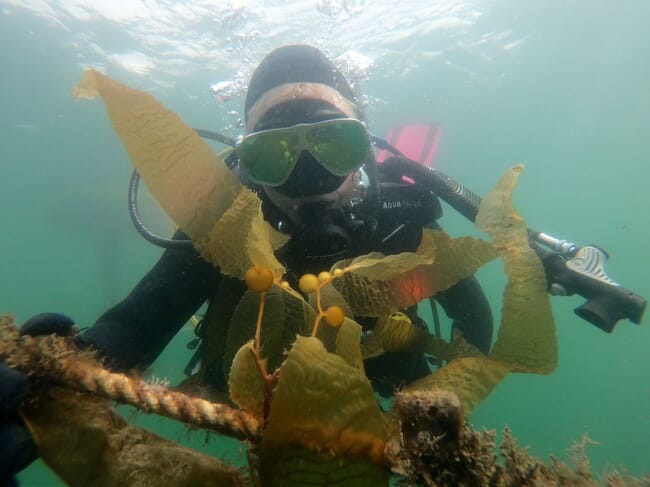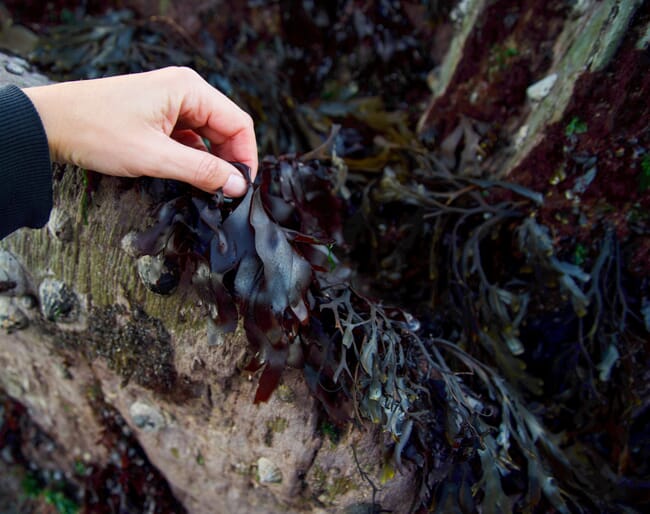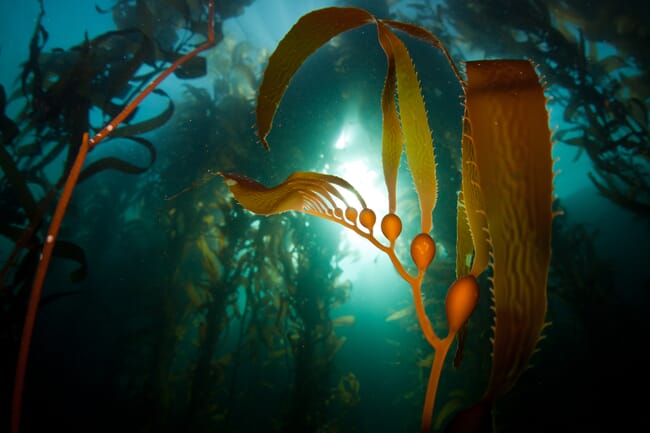
Sunken Seaweed is led by two marine ecologists committed to pioneering sustainable seaweed aquaculture in San Diego © Sunken Seaweed LLC
According to a news release, the port is also investing an additional $100,000 in the Sunken Seaweed project in exchange for an increase in revenue share from 5 percent to 6 percent and an extended revenue share period from 2043 to 2048.
Sunken Seaweed is led by two marine ecologists committed to pioneering sustainable seaweed aquaculture in San Diego. They are growing culinary seaweeds including dulse, sea lettuce, ogo and other larger kelp varieties. Sunken Seaweed’s goal is to sell their seaweed to chefs and food production and distribution companies. They are also exploring a range of products including fertilisers, human food supplements and livestock feed additives. Sunken Seaweed’s pilot farm is located at the Northwestern end of San Diego Bay.
“Sunken Seaweed has successfully established a seaweed farm in San Diego Bay and the results they’re seeing and partnerships they’ve formed are promising. It makes sense for us – both from an economic and environmental standpoint – to help them grow their operations and hopefully someday flourish as a long-time business in our waters. Doing so can help expand aquaculture in our region and throughout the state while also improving water quality, enhancing our ecosystems and mitigating climate change impacts,” said Vice Chairman Rafael Castellanos, Port of San Diego Board of Port Commissioners.
The amended agreement will allow Sunken Seaweed to continue conducting seaweed and shellfish aquaculture ecosystem services research in San Diego Bay. Additionally, they’ll be able to expand and scale their land-based seaweed aquaculture operations at a new satellite location in Humboldt Bay in collaboration with a well-established, vertically integrated aquaculture company, Hog Island Oyster Company. The amendment will support the scaling of Sunken Seaweed operations and allow the company to position itself as an industry leader in seaweed production, as well as in ecosystem services research applied to seaweed aquaculture in port environments.
“Through the Port of San Diego’s initial investment in 2017, Sunken Seaweed and San Diego State University marine ecologists have been able to conduct extensive research and development in seaweed aquaculture and discovered the huge potential that San Diego possesses in this field,” said Leslie Booher, co-founder of Sunken Seaweed. “With this reinvestment, not only can we now bring our farmed seaweeds to the market, but we’re able to continue working with expert researchers and engaging young people interested in sustainable aquaculture in San Diego. This is how we grow the blue economy and we’re thrilled that our partners at the Port are champions of this sector.”
The Sunken Seaweed pilot project is part of the Port’s Blue Economy Incubator, established to assist in the creation, development and scaling of new water-dependent business ventures on San Diego Bay focusing on sustainable aquaculture and Port-related blue technologies.

Sunken Seaweed is growing culinary seaweeds like dulse, sea lettuce, ogo and other larger kelp varieties
The Sunken Seaweed project boasts a host of ecological and economic benefits. The Port can use results of the pilot project to assess seaweed aquaculture as a tool for:
- Bioremediation to improve water quality – seaweed and shellfish can absorb and/or filter certain contaminants such as excess nitrogen from on-land runoff, heavy metals and PCBs
- Carbon sequestration – seaweed can help reduce greenhouse gases by storing atmospheric carbon
- Coastal habitat and infrastructure protection – seaweed and shellfish can dampen storm surge caused by climate change-driven sea level rise
- Habitat restoration and fisheries enhancement – seaweed and shellfish provide habitat, foraging opportunities and refuge for local fisheries and non-fisheries species
- Mitigation Banking

Seaweed aquaculture comes with a myriad of ecological and economic benefits © Kelp Blue
Additionally, shellfish and seaweed aquaculture is more ecologically beneficial and sustainable than land farming – it doesn’t require fertiliser, pesticides, added nutrients or fresh water. Seaweed and shellfish absorb all their nutrient requirements from sunlight and the surrounding water and no waste is produced.
Economically, the Port will collect royalties as the project grows and produces revenue and the project will inform future aquaculture operations and ecosystem services research within and around San Diego Bay and other ports throughout the state.




